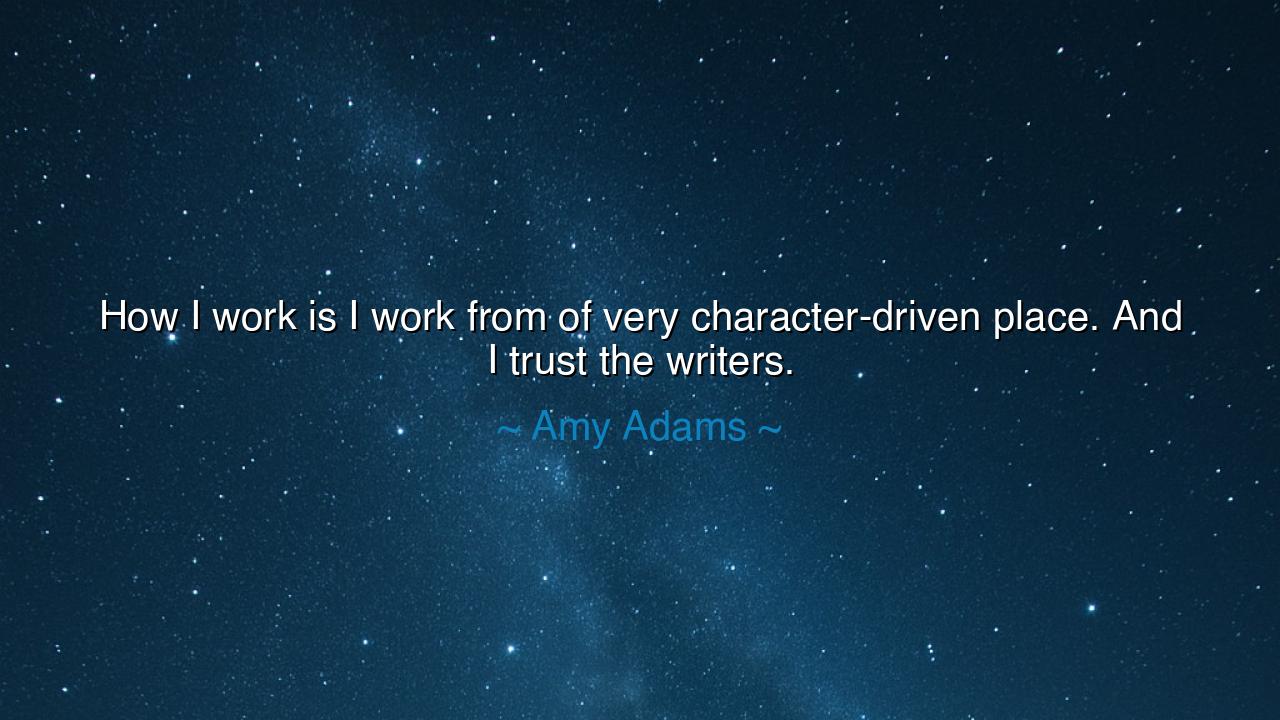
How I work is I work from of very character-driven place. And I






The words of Amy Adams rise like a quiet yet steady flame: “How I work is I work from a very character-driven place. And I trust the writers.” In this confession, she unveils a truth not only about her craft as an actor, but about the essence of all creation, collaboration, and faith in human endeavor. To be character-driven is to let the heart of a story—not spectacle, not vanity, not mere performance—guide one’s path. And to trust the writers is to surrender ego, to honor those who shape the foundation upon which the art is built.
From the ancients, too, we learn this principle. The dramatists of Greece—Sophocles, Euripides, Aeschylus—forged characters whose struggles still breathe in our imaginations. Their actors, standing in the theaters of Athens, did not seek to outshine the playwright, but to embody the souls placed before them. In this unity of voice and body, of writer and performer, the plays became eternal. Adams’ words echo this lineage: the actor who humbles themselves before the truth of character and the vision of the writer partakes in an art greater than any single self.
The meaning is layered. To be character-driven is to search for the humanity within the mask. It is to ask not, “How can I appear impressive?” but “What is true in this soul I now inhabit?” The ancient Stoics would call this alignment with nature—acting not for applause, but in harmony with the truth of the role. And to trust the writers is to believe that wisdom may come from another’s pen, that one’s greatness lies not in domination but in collaboration. For no actor without words, and no words without trust, can produce art that endures.
Consider the example of Marlon Brando, who, though he brought fire and genius to his roles, always began by respecting the script, the writers who crafted the lines. His genius lay not in defiance of text, but in bringing text to life with raw humanity. When he delivered lines like “I coulda been a contender,” it was not merely Brando, but Brando and Budd Schulberg, the writer, fused into one. Together they created something immortal. Adams’ statement draws from the same well: the recognition that art is born of trust between the seen and the unseen, between the performer and the page.
And yet, Adams’ wisdom goes beyond acting. It speaks to all who labor in any field: do not let ego blind you to the gifts of others. Work from a place that is character-driven, centered in authenticity and humanity, not in hollow performance. And trust those who labor beside you, those whose hands and minds build the paths you walk. For greatness is never solitary; it is born in the weaving together of many threads.
The lesson is this: find the character within yourself and within all that you do. Let integrity, sincerity, and humanity drive your actions, rather than vanity or show. And honor those who contribute silently, whose words, plans, and foundations you may stand upon. To trust is not weakness; it is the soil in which lasting creations grow.
Practical actions follow: in your work, begin by asking what is true, not what will impress. In your relationships, listen to those who guide and support, for their vision strengthens your own. When part of a team, honor the unseen hands—the writers of your story—and give them your trust. In this way, whether on stage, in work, or in life, you will build not fleeting performance, but enduring art.






NHNhan Huynh
I love that Amy Adams trusts the writers and works from a character-driven place. It seems like that trust could really create magic on screen, allowing the actors to dig deeper into their roles. How do you think the relationship between an actor and writer affects the final performance? Is there a point where trust in the script needs to be balanced with the actor's own interpretation and instincts?
NVHien Luong Nguyen Vu
Amy Adams’ perspective on working from a character-driven place really resonates with me. It shows how deeply an actor must connect with the essence of the story. However, can an actor's understanding of the character sometimes diverge from the writer's intent? How do actors navigate that balance of trust while also bringing their own creative interpretation to the role?
KHKha Han
What I find interesting about Amy Adams’ process is her emphasis on character-driven work. It shows a deep respect for the narrative and the writer’s vision. How much do you think an actor’s trust in the script shapes the outcome of a movie or show? Can this level of trust lead to a more authentic performance, or is it possible to over-rely on the writers and lose the actor’s own creative input?
LLLong Le
Amy Adams' approach of working from a character-driven place speaks to the importance of depth in storytelling. When actors truly trust the writers, it seems like they’re able to bring out more authenticity in their performances. I wonder, though, how much of an actor’s own interpretation influences their portrayal of the character? Does trust in the script mean they always follow it, or is there room for improvisation?
TTNguyen Dung Huy Thuy Tho
I really admire Amy Adams' approach to her work, focusing on character-driven storytelling. It’s refreshing to hear how much she trusts the writers, especially since actors often get more attention for their performances than the creators behind the script. How important do you think it is for an actor to truly connect with the character and the story? Can that trust in the writers make a difference in how the performance turns out?